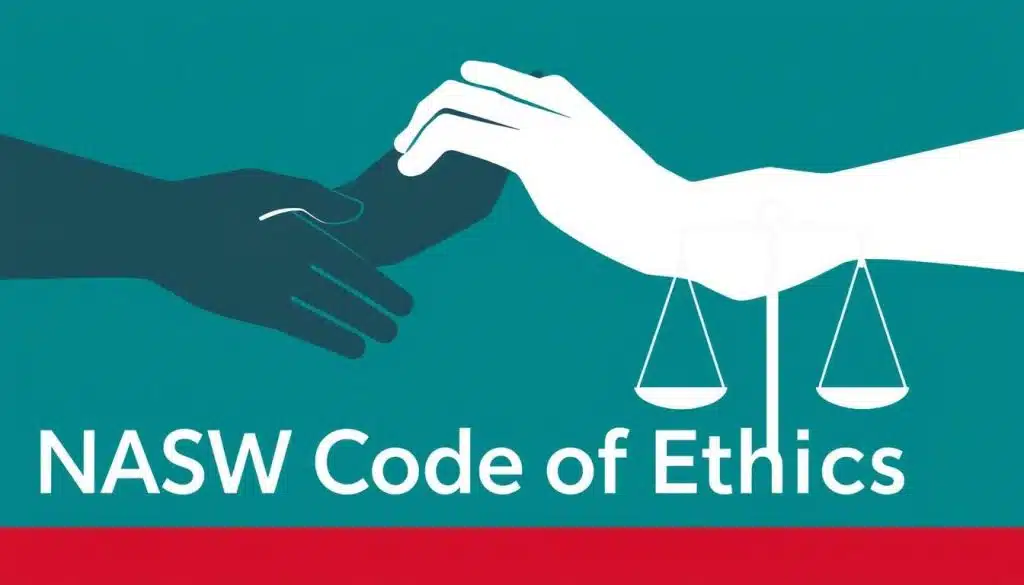Are you getting ready for the Bachelors (BSW), Masters (LMSW), or Clinical (LCSW) level Association of Social Work Boards (ASWB) Licensing Exam? You’ll face tough questions about the nasw code of ethics on test day. Knowing social work code of ethics nasw is key to passing the social work exam.
But what is the NASW social work ethics code? How can you make sure you’re ready for code of ethics social work questions? Let’s explore why ethical knowledge is vital for social work professionals.
The National Association of Social Work (NASW) Code of Ethics guides social workers in the U.S. It’s based on six core values: service, social justice, dignity and worth of the person, importance of human relationships, integrity, and competence. This Code sets the ethical standards for all social workers, no matter their role or area of practice.
The NASW Code of Ethics got updated in 2021. It now stresses the importance of cultural humility and professional self-care for social workers. The updated Code emphasizes the need for social workers to reflect on themselves, acknowledge biases, and learn about diverse cultures.
It also highlights the need for social workers to take care of themselves. This ensures they can support their clients effectively.

The code of ethics social work is key to the social work field. It sets out the ethical rules and standards for social workers. This ensures they act with the highest integrity and serve their clients well.
Knowing the social work code ethics is vital for passing the ethics test needed for a license. It shapes the content and questions on the ASWB (Association of Social Work Boards) exam.
The NASW (National Association of Social Workers) Code of Ethics applies to all social work students and professionals. It helps them navigate when their duties might clash with their mission. This code offers clear guidance for making ethical choices.
Being familiar with the code lets social workers spot unethical behavior in their peers. This keeps the profession honest and accountable. By following the NASW ethics, social workers earn the public’s trust and make a real difference in their communities.
“The NASW Code of Ethics is the ethical standard that guides the social work profession. It is essential for social workers to understand and apply this code in their daily practice.”
Integrating the code of ethics social work into one’s career is crucial. It’s not just for passing the ethics test. It makes a social worker well-rounded, ethical, and effective. The NASW ethics guide social work practices, ensuring they stay true to the profession’s core values.

It’s crucial to thoroughly review the NASW Code of Ethics to pass the ASWB exam. It won’t be enough to just read it once or twice. Social workers need to dive deep, section by section, thinking about ethical scenarios and how to respond according to the Code. This approach will help them master the ethics questions on the ASWB Licensing Exam.
The ASWB exam often tests your knowledge on confidentiality, mandated reporting, and dual relationships. You must understand the role of confidentiality and its limits. You also need to know when to report abuse or neglect. Lastly, being mindful of dual relationships and how to steer clear of them is key.
Mastering the ethics questions on the ASWB exam requires a comprehensive understanding of various fundamental concepts, including mandated reporting and the implications of dual relationships in social work practice. The National Association of Social Workers (NASW) Code of Ethics outlines crucial guidelines that professionals must adhere to, particularly regarding when and how to report cases of abuse or neglect. It is imperative for examinees to recognize their role as mandated reporters in situations where they suspect child or elder abuse, as well as domestic violence, ensuring that they prioritize the safety and well-being of vulnerable populations.
One key area that candidates must navigate is the concept of dual relationships, which occurs when a social worker has multiple forms of involvement with a client, whether professional, social, or familial. Understanding the nuances of dual relationships is essential, as they can complicate the therapeutic alliance, blur professional boundaries, and lead to ethical dilemmas. The NASW Code of Ethics stresses the importance of maintaining professional integrity by avoiding situations that could exploit or harm the client, thus reinforcing the need for clear boundaries in the practitioner-client dynamic.
When preparing for the ASWB exam, it is vital to not only memorize the definitions and rules outlined in the NASW Code of Ethics but also to engage in critical thinking about how these principles apply in real-world scenarios. Questions may present a variety of situations that test your judgment on what constitutes a dual relationship and how to handle such circumstances ethically. According to the nasw code of ethics dual relationships understanding the potential ethical pitfalls associated with dual relationships equips candidates with the foresight needed to navigate challenging interactions in their future practice.
By thoroughly reviewing the NASW Code of Ethics and considering ethical scenarios, social workers can increase their chances of passing the ASWB exam. The exam preparation resources from The Digital Chalk (TDC) can also aid in mastering the ethics questions.
“The ASWB exam preparation resources emphasize the importance of being well-versed in confidentiality issues for the exam.”
The NASW code of ethics is key for the ASWB (Association of Social Work Boards) exam. It sets the standards and principles for social workers. The exam tests how well candidates apply these ethics in different situations.
Some questions ask what a social worker should do first in a scenario. This shows the importance of client safety and ethics. These questions check if the candidate can quickly spot the main issues and take the right first steps.
Other questions ask about the next steps after an initial action. These “What should the social worker do NEXT” questions require you to assess the situation, find remaining issues, and decide the next steps. You should also think about resources, use your knowledge, and consider outcomes.
To do well on both types of questions, you need to know a lot, think critically, and understand social work principles and ethics. The NASW code of ethics is your guide.
As a social worker, your ethics are key. The NASW Code of Ethics sets the standards for your work. Knowing this code well is vital for the ASWB social work exam.
Ethics and the NASW Code of Ethics are at the heart of social work. Understanding the code helps you handle tough ethical choices. This knowledge is essential for passing the ASWB exam.
The ASWB exam tests your grasp of ethics in social work. Questions on the code of ethics, ethical decision-making, and professional boundaries are common. Knowing these well can help you pass.
To do well on the ASWB exam, you need to know the NASW Code of Ethics inside out. By mastering it, you’ll be ready to tackle ethical challenges. This shows you’re a skilled social worker and boosts your exam score.
“Ethical practice is not just a box to check, but a fundamental part of being an effective and responsible social worker. Understanding the NASW Code of Ethics is critical for passing the ASWB exam and ensuring you are prepared to make ethical decisions in your future practice.”
The NASW Code of Ethics guides social workers through tough situations. It affects every part of their job. This includes respecting clients, fighting for justice, and keeping professional boundaries.
To follow the NASW Code of Ethics, social workers need to think deeply about ethics. They should fight for justice and build strong relationships. Here are some tips:
By using these tips, social workers can stick to the NASW Code of Ethics. They will give the best ethical and professional care to their clients.
Learning the NASW Code of Ethics is key for social workers aiming to pass the ASWB exam. Understanding the six core values and the latest updates to the code shows a commitment to ethical practice. This boosts their chances of doing well on the exam.
By applying the code of ethics in real-life situations, social workers become more skilled. They also get better at answering ethics-related questions. This makes them more effective and culturally aware professionals.
The social work code of ethics is more than rules. It’s a guiding light for the profession. By living the NASW ethics every day, social workers can truly help people and communities.
This approach to ethics is crucial for success on the ASWB exam. It also ensures the highest care in social work.
As the profession evolves, the NASW Code of Ethics stays a constant source of guidance. Social workers who uphold these principles can bring about real change. They fight for justice, inclusion, and empower those who are marginalized.
This dedication to ethics and cultural competence is not just a rule. It’s a calling that defines social work.